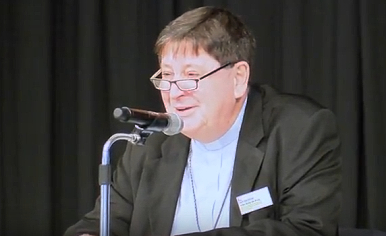
24 Oct 2018 | Focolare Worldwide
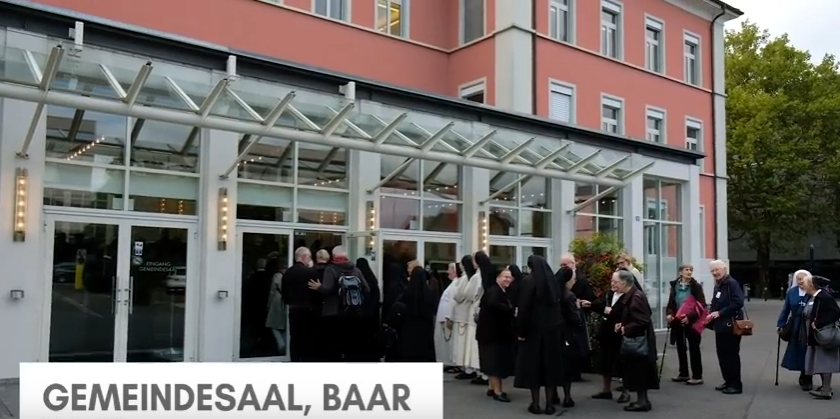 In the heart of Europe with its 7.8 million inhabitants within a territory of 41 thousand km, Switzerland is a small country with a broad variety of languages, cultures and religions which has also been held up as a model of successful integration. The spirituality of unity, which is particularly congenial to a social fabric oriented towards relationships and acceptance spread rapidly in this land ever since 1960 and caught on quickly. Many successive spiritual intutions regarding the development of Focolare spirituality are linked to the summer holidays Chiara Lubich spent in the Swiss valleys. A centre of formation has been operating in Baar since 1975. It is open to all and has become, over time, the heart of the Focolare town of “Eckstein” (cornerstone) where several small businesses operate. The centre offers opportunities for contact and encounter not only among Catholic and Reformed Christians.
In the heart of Europe with its 7.8 million inhabitants within a territory of 41 thousand km, Switzerland is a small country with a broad variety of languages, cultures and religions which has also been held up as a model of successful integration. The spirituality of unity, which is particularly congenial to a social fabric oriented towards relationships and acceptance spread rapidly in this land ever since 1960 and caught on quickly. Many successive spiritual intutions regarding the development of Focolare spirituality are linked to the summer holidays Chiara Lubich spent in the Swiss valleys. A centre of formation has been operating in Baar since 1975. It is open to all and has become, over time, the heart of the Focolare town of “Eckstein” (cornerstone) where several small businesses operate. The centre offers opportunities for contact and encounter not only among Catholic and Reformed Christians. 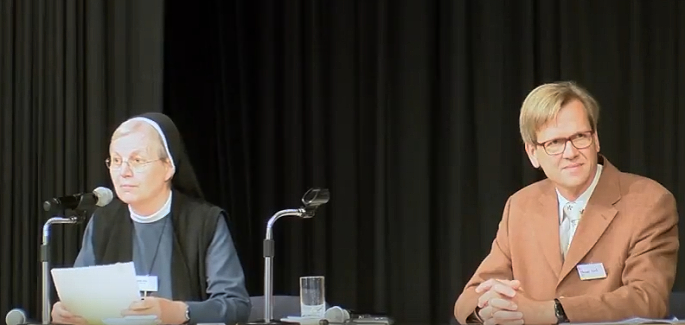 At the end of September a meeting was held for around 400 men and women Religious, first at City Hall which is not far from the Centre. The group was restricted to superiors and persons in positions of responsibility, with the behind the scenes assistance of Focolare members. The participants were members of eighty communities, including a dozen from the Reformed Church and an Orthodox community, as well as members of Secular Institutes, Movements and Ecclesial Families.
At the end of September a meeting was held for around 400 men and women Religious, first at City Hall which is not far from the Centre. The group was restricted to superiors and persons in positions of responsibility, with the behind the scenes assistance of Focolare members. The participants were members of eighty communities, including a dozen from the Reformed Church and an Orthodox community, as well as members of Secular Institutes, Movements and Ecclesial Families.  “In today’s world we have to help each other to stand together, to not look at the barriers between us, not our differences that must nevertheless be preserved. But we have to do in such a way that all our differences shine in one grand experience, in the footsteps of Christ and of our founders.” These were the words of Cardinal Joâo Braz de Aviz, who attended the meeting. In one interview, the Prefect of the Congregation for the Consecrated Life explained: “All the structures that form the Church – Religious, Hermits, Monks, Nuns, Brothers, Sisters, Secular Institutes – all of them are seeking a common life. In today’s culture everything has drawn closer together.” “At this moment in time,” he explained, “we are in need of a path that we can take together and, even we who belong to Orders, Congregations and Consecrated Life, need a tool, a way of life that draws us together in all ways. This is not the path we took at first, that of an individual spirituality, that is preserved. We need to move on to ‘looking’ together, to looking at the other with the same attentiveness with which we look at ourselves. All of this we are just beginning to learn, including us cardinals…” He concluded: “I wish that all of us, in this moment, would sum up all of our beauties and form one grand unity, remembering what Pope Francis says: “Unity is not built [by] destroying, but harmonizing the diversity.” It’s a path that at times causes fatigue, because we have to learn to go out towards the others, “the first move we have to make is to go towards the other,” as the Pope points out. If we don’t go out of ourselves, we remain at the centre. This is beginning here in Switzerland, with simplicity, as if we were all at the School of Mary.”
“In today’s world we have to help each other to stand together, to not look at the barriers between us, not our differences that must nevertheless be preserved. But we have to do in such a way that all our differences shine in one grand experience, in the footsteps of Christ and of our founders.” These were the words of Cardinal Joâo Braz de Aviz, who attended the meeting. In one interview, the Prefect of the Congregation for the Consecrated Life explained: “All the structures that form the Church – Religious, Hermits, Monks, Nuns, Brothers, Sisters, Secular Institutes – all of them are seeking a common life. In today’s culture everything has drawn closer together.” “At this moment in time,” he explained, “we are in need of a path that we can take together and, even we who belong to Orders, Congregations and Consecrated Life, need a tool, a way of life that draws us together in all ways. This is not the path we took at first, that of an individual spirituality, that is preserved. We need to move on to ‘looking’ together, to looking at the other with the same attentiveness with which we look at ourselves. All of this we are just beginning to learn, including us cardinals…” He concluded: “I wish that all of us, in this moment, would sum up all of our beauties and form one grand unity, remembering what Pope Francis says: “Unity is not built [by] destroying, but harmonizing the diversity.” It’s a path that at times causes fatigue, because we have to learn to go out towards the others, “the first move we have to make is to go towards the other,” as the Pope points out. If we don’t go out of ourselves, we remain at the centre. This is beginning here in Switzerland, with simplicity, as if we were all at the School of Mary.”
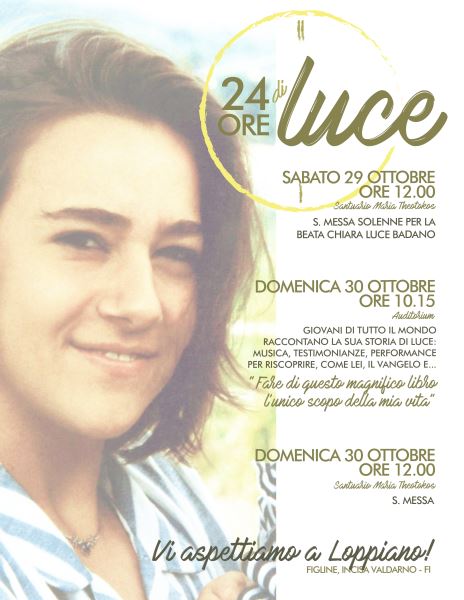
23 Oct 2018 | Focolare Worldwide
 At the Focolare’s international town of Loppiano, “24 Hours of Light” returns on October 27-28, dedicated to Chiara Luce Badano. The event will offer two days of prayer, performances, testimonies and music about the life of Blessed Chiara Luce Badano who died of osteosarcoma at the age of 18. She is one of the young witnesses at the Synod on Youth and, together with her, this years protagonist is the Gospel that the Blessed Chiara Luce described as “her only scope in life.” The event is open to all and will begin on Saturday, October 27 with Holy Mass at noon in the Mary Theotokos Shrine of Loppiano. “24 Hours of Light” is promoted by the Focolare youth living in Loppiano and attending the Gen School formation centre for young people from around the world.
At the Focolare’s international town of Loppiano, “24 Hours of Light” returns on October 27-28, dedicated to Chiara Luce Badano. The event will offer two days of prayer, performances, testimonies and music about the life of Blessed Chiara Luce Badano who died of osteosarcoma at the age of 18. She is one of the young witnesses at the Synod on Youth and, together with her, this years protagonist is the Gospel that the Blessed Chiara Luce described as “her only scope in life.” The event is open to all and will begin on Saturday, October 27 with Holy Mass at noon in the Mary Theotokos Shrine of Loppiano. “24 Hours of Light” is promoted by the Focolare youth living in Loppiano and attending the Gen School formation centre for young people from around the world.
22 Oct 2018 | Focolare Worldwide
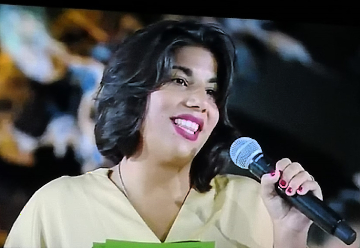
21 Oct 2018 | Focolare Worldwide
 Ana is 19 and lives in Spain. She started to talk while she walked onto the stage of the Paul VI Hall. “In order to better know about the socio-sanitary sector, last March I went to a hospital in my city,” she recounted. In the hospital she was received by a social worker who, instead of many words, lent her a gown, put a case sheet in her hand, and accompanied her to the room of a patient: “When I entered and saw him, a shiver ran down my spine. I had to leave for a second to take a deep breath.” On the bed lay a boy, just a bit older than her, a terminal cancer patient. Ana took courage and returned to the room: «How are you?» He looked her with surprise, and asked her to repeat the question. “The first thing I did was to present myself – then he said – I have been here for two months now. I have bone cancer and I don’t have much time to live and I feel that I am losing everything: the family, my job, my girlfriend. My life no longer has a meaning.” Ana was in a state of shock. A million emotions and thoughts passed through her heart and mind. However, she tried to start a conversation by telling him about herself and her life. After a few minutes of silence the boy asked: “Do you believe in God?” Once again Ana was taken aback but answered with a big “yes.” “I instead, say no, since he has abandoned me – he added – because in just a few month he will take my life. He has really left me alone.” The young Andalusian girl entrusted herself to God before answering: “What you feel now has a name, it is ‘Jesus Forsaken.’ God has not abandoned you and he continues to stand by you more than ever. He is putting you to the test and with what you are undergoing is asking you a question which you still may not have answered: “Can you follow me also in the greatest suffering?” He has chosen this cross for you and for you alone, for a reason, because he wants you to bear witness to his love. He wants to make you a saint. You can become a saint if you accept and receive this suffering, and if you take it as something that comes from God and not as something you own. Then, without second thoughts, start loving the people around you, your parents, your girlfriend, your friends, making them see that you do not fear death because you have found something precious that helps you to live moment by moment, without thinking of what you will be tomorrow.” “Through the social worker I found out a few days after my visit, that his health had worsened, Ana recounted – and that he asked to receive the sacrament of the sick, to be able to go in peace. After some time, I received this letter…” On the stage of the Paul VI Hall, a young actor reads out Hugo’s letter: “Hi Ana, let me tell you something about myself. These have been difficult days since the cancer has advanced much faster. I felt more tired and weak, but those were the occasions in which I had to love more. These have been hard days since I saw that death was coming closer and it scared me a bit. But when this happened, I remembered that it is not death that beckons, but God: he was calling me to be with Him in Heaven, and this gave me the strength to smile, to love. I have now very little time left down here, Ana, but I must tell you that now I am not afraid because I know that I shall be fine up there. Thank you for pulling me out of that deep hole, for listening to me, but above all, thanks for having brought a new God into my life. I want you now to live for both of us, enjoy for both of us, and fulfill all your dreams. I shall always be beside you, and from Heaven, I will take care of you every day, I shall be like your little guardian angel. I gave the social worker a cross which she will give you on my behalf. I have always worn it since my first Communion, but I want you to have it so that when you look at it, you will remember that this is the Cross that God wished for you and has to be borne with joy and love always. I shall await you in Paradise, Ana.” Tamara Pastorelli Source: www.cittanuova.it
Ana is 19 and lives in Spain. She started to talk while she walked onto the stage of the Paul VI Hall. “In order to better know about the socio-sanitary sector, last March I went to a hospital in my city,” she recounted. In the hospital she was received by a social worker who, instead of many words, lent her a gown, put a case sheet in her hand, and accompanied her to the room of a patient: “When I entered and saw him, a shiver ran down my spine. I had to leave for a second to take a deep breath.” On the bed lay a boy, just a bit older than her, a terminal cancer patient. Ana took courage and returned to the room: «How are you?» He looked her with surprise, and asked her to repeat the question. “The first thing I did was to present myself – then he said – I have been here for two months now. I have bone cancer and I don’t have much time to live and I feel that I am losing everything: the family, my job, my girlfriend. My life no longer has a meaning.” Ana was in a state of shock. A million emotions and thoughts passed through her heart and mind. However, she tried to start a conversation by telling him about herself and her life. After a few minutes of silence the boy asked: “Do you believe in God?” Once again Ana was taken aback but answered with a big “yes.” “I instead, say no, since he has abandoned me – he added – because in just a few month he will take my life. He has really left me alone.” The young Andalusian girl entrusted herself to God before answering: “What you feel now has a name, it is ‘Jesus Forsaken.’ God has not abandoned you and he continues to stand by you more than ever. He is putting you to the test and with what you are undergoing is asking you a question which you still may not have answered: “Can you follow me also in the greatest suffering?” He has chosen this cross for you and for you alone, for a reason, because he wants you to bear witness to his love. He wants to make you a saint. You can become a saint if you accept and receive this suffering, and if you take it as something that comes from God and not as something you own. Then, without second thoughts, start loving the people around you, your parents, your girlfriend, your friends, making them see that you do not fear death because you have found something precious that helps you to live moment by moment, without thinking of what you will be tomorrow.” “Through the social worker I found out a few days after my visit, that his health had worsened, Ana recounted – and that he asked to receive the sacrament of the sick, to be able to go in peace. After some time, I received this letter…” On the stage of the Paul VI Hall, a young actor reads out Hugo’s letter: “Hi Ana, let me tell you something about myself. These have been difficult days since the cancer has advanced much faster. I felt more tired and weak, but those were the occasions in which I had to love more. These have been hard days since I saw that death was coming closer and it scared me a bit. But when this happened, I remembered that it is not death that beckons, but God: he was calling me to be with Him in Heaven, and this gave me the strength to smile, to love. I have now very little time left down here, Ana, but I must tell you that now I am not afraid because I know that I shall be fine up there. Thank you for pulling me out of that deep hole, for listening to me, but above all, thanks for having brought a new God into my life. I want you now to live for both of us, enjoy for both of us, and fulfill all your dreams. I shall always be beside you, and from Heaven, I will take care of you every day, I shall be like your little guardian angel. I gave the social worker a cross which she will give you on my behalf. I have always worn it since my first Communion, but I want you to have it so that when you look at it, you will remember that this is the Cross that God wished for you and has to be borne with joy and love always. I shall await you in Paradise, Ana.” Tamara Pastorelli Source: www.cittanuova.it
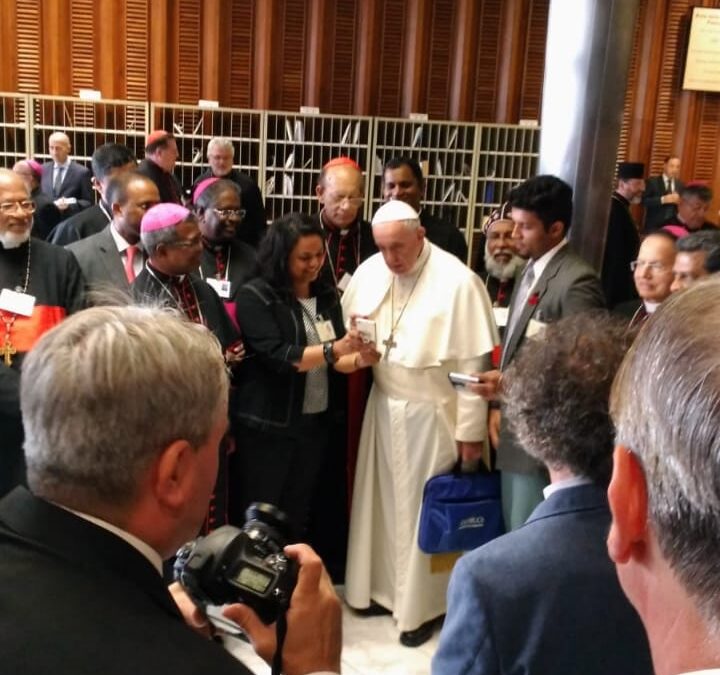
19 Oct 2018 | Focolare Worldwide
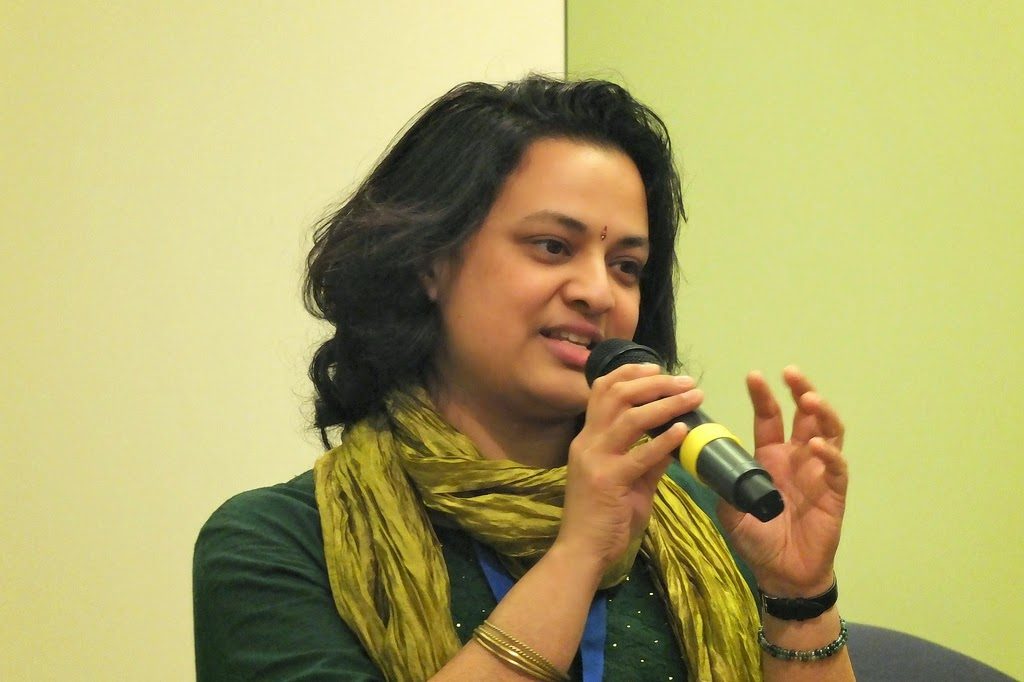 Cherylanne (Doni) Menezes is from Mumbai. She is part of the delegation of 11 members representing India at the Synod on Youth, underway in Rome up to 28 October. Raised in a family that is very active in the district parish, and within the context of a multi-religious community, after her studies in economy and business Cherylanne started to work in the field of management. But her broad range of interests led her to acquire a Master’s at the Sophia University in Loppiano, Italy, where she wrote a thesis on Hindu-Christian dialogue in the Focolare Movement, where still today she is committed with the young people of her country. I met her during a break during the synodal works. The Indian delegation is headed by Cardinal Oswald Gracias, Archbishop of Mumbai, and is composed of 9 bishops (of the Latin, Syro- Malabar and Syro-Malankar churches) and another lay person, Percival, President of the Indian Catholic Youth Movement. Cherylanne is attending the Synod as a representative of the Focolare Movement in India. She has met Pope Francis twice, together with the delegation. The first was at the start of the works (“Also the Hindu youths of the Focolare Movement are praying for you and for this event,” she said to the Pope, who reacted with a happy exclamation) and the second when the Synod had already started.
Cherylanne (Doni) Menezes is from Mumbai. She is part of the delegation of 11 members representing India at the Synod on Youth, underway in Rome up to 28 October. Raised in a family that is very active in the district parish, and within the context of a multi-religious community, after her studies in economy and business Cherylanne started to work in the field of management. But her broad range of interests led her to acquire a Master’s at the Sophia University in Loppiano, Italy, where she wrote a thesis on Hindu-Christian dialogue in the Focolare Movement, where still today she is committed with the young people of her country. I met her during a break during the synodal works. The Indian delegation is headed by Cardinal Oswald Gracias, Archbishop of Mumbai, and is composed of 9 bishops (of the Latin, Syro- Malabar and Syro-Malankar churches) and another lay person, Percival, President of the Indian Catholic Youth Movement. Cherylanne is attending the Synod as a representative of the Focolare Movement in India. She has met Pope Francis twice, together with the delegation. The first was at the start of the works (“Also the Hindu youths of the Focolare Movement are praying for you and for this event,” she said to the Pope, who reacted with a happy exclamation) and the second when the Synod had already started. 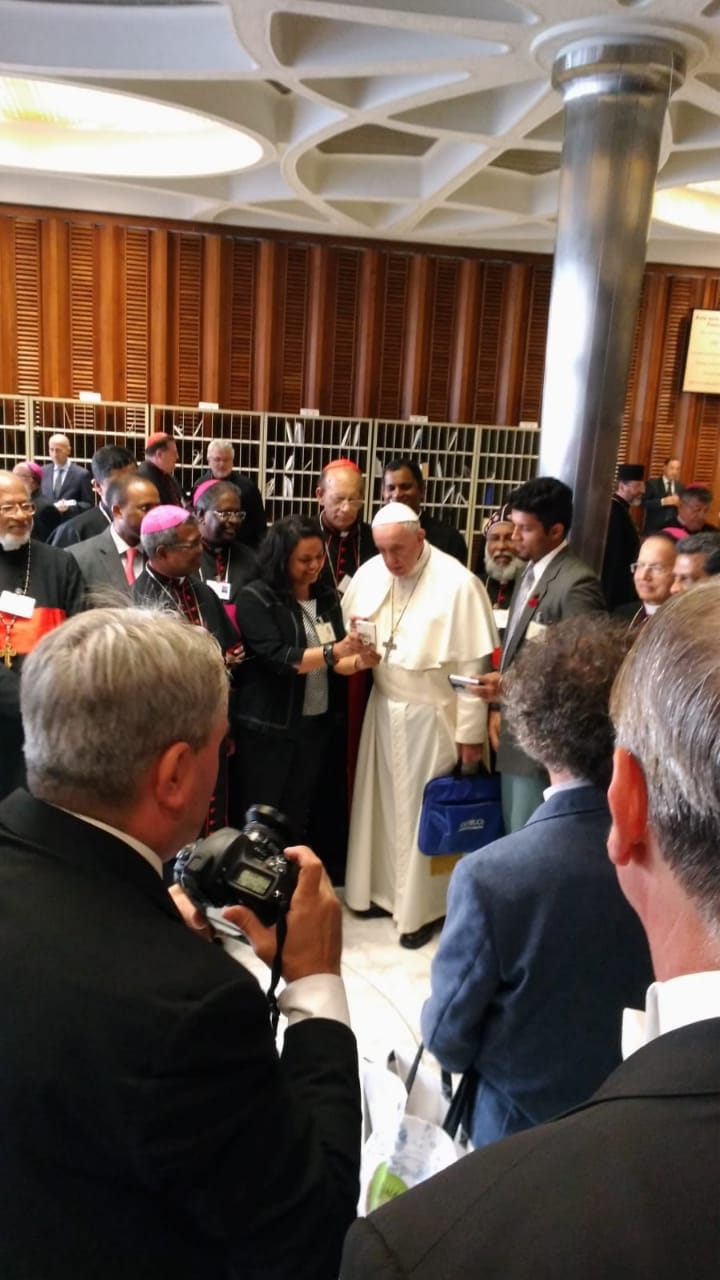 The new appointment was for 17 October. The delegation arrived on time, at the entrance of Aula Nervi, at 4 p.m., together with that of South America. The afternoon session started at 4.30, and half an hour earlier Pope Francis met the single groups, in a joyful and informal personal encounter that was an integral part of the Synodal spirit. Percival gave the Pope a sandalwood cross bearing the image of the Good Shepherd, work of a Hindu artist. “I have also letters for you, Holy Father” Cherylanne added. The letters are wonderful, full of affection of the youth and families of India. Among these were also those of two youths, a Hindu and a Muslim. Besides talking of themselves, they put down in writing the promise to pray for the Pope and the Synod. “Yes, because this is the Synod of all the youth,” Cherylanne explained. On consigning the cross and the letters, Cherylanne dared to ask: “Holy Father, would you like to answer with a video-message to these two young people?” “Certainly,” the Pope answered. She took out her cell phone and the Pope turned to look right into the screen. “I want to thank you for your greeting. I greet you too. I pray for you, and ask you to pray for me. We are one in friendship. Unity is always superior to the wars. Work for unity among peoples, respect the identity of one another, whatever religion you profess. May the Lord bless you… Pray for me!” The very short video captured a last frame, the smile of Pope Francis, and the mission ended successfully. Taking a shoot of Pope Francis’ greeting with one’s own cell phone is not something that happens every day, I said. “It wasn’t an act of courage – she said – I just grabbed the opportunity, Pope Francis is always so easy to approach.” How is the experience of the Synod coming along? I asked. “We are experiencing a moment of insight in which the Holy Spirit is at work, and renews everything. The experience which the disciples on the road to Emmaus had lived well describes what we are experiencing. The Church is becoming aware not only of its challenges, but also of its internal wealth and potential. I see a growing convergence in our ideas, here at the Synod, and the urgency to walk together, youths and bishops, clergy and laity, religious movements and associations, in order to go towards the world together and demonstrate our love in action.” Chiara Favotti https://vimeo.com/296453712
The new appointment was for 17 October. The delegation arrived on time, at the entrance of Aula Nervi, at 4 p.m., together with that of South America. The afternoon session started at 4.30, and half an hour earlier Pope Francis met the single groups, in a joyful and informal personal encounter that was an integral part of the Synodal spirit. Percival gave the Pope a sandalwood cross bearing the image of the Good Shepherd, work of a Hindu artist. “I have also letters for you, Holy Father” Cherylanne added. The letters are wonderful, full of affection of the youth and families of India. Among these were also those of two youths, a Hindu and a Muslim. Besides talking of themselves, they put down in writing the promise to pray for the Pope and the Synod. “Yes, because this is the Synod of all the youth,” Cherylanne explained. On consigning the cross and the letters, Cherylanne dared to ask: “Holy Father, would you like to answer with a video-message to these two young people?” “Certainly,” the Pope answered. She took out her cell phone and the Pope turned to look right into the screen. “I want to thank you for your greeting. I greet you too. I pray for you, and ask you to pray for me. We are one in friendship. Unity is always superior to the wars. Work for unity among peoples, respect the identity of one another, whatever religion you profess. May the Lord bless you… Pray for me!” The very short video captured a last frame, the smile of Pope Francis, and the mission ended successfully. Taking a shoot of Pope Francis’ greeting with one’s own cell phone is not something that happens every day, I said. “It wasn’t an act of courage – she said – I just grabbed the opportunity, Pope Francis is always so easy to approach.” How is the experience of the Synod coming along? I asked. “We are experiencing a moment of insight in which the Holy Spirit is at work, and renews everything. The experience which the disciples on the road to Emmaus had lived well describes what we are experiencing. The Church is becoming aware not only of its challenges, but also of its internal wealth and potential. I see a growing convergence in our ideas, here at the Synod, and the urgency to walk together, youths and bishops, clergy and laity, religious movements and associations, in order to go towards the world together and demonstrate our love in action.” Chiara Favotti https://vimeo.com/296453712
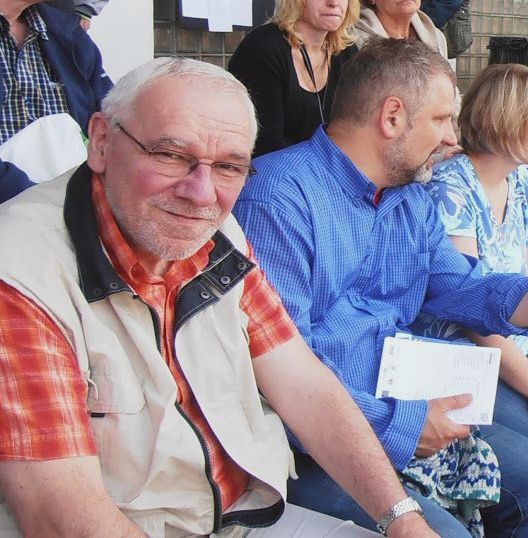
18 Oct 2018 | Focolare Worldwide
The next event with the Friends of “Together for Europe” is going to be held in Prague, the land of the Hussites, the Prague Spring and the Velvet Revolution. The vast history of the Czech people will serve as the backdrop for the conversation among participants. It is a troubled history, marked by grand idealistic and spiritual re-awakenings and by a search for truth and justice that often ended in disappointment. Thus was the case of the three examples just mentioned: the Hussite Movement that began after the death of the priest Jan Hus, who was burned at the stake in 1415 and considered a martyr for the truth by his followers. Unfortunately, the wars that followed didn’t deal in truth, but in the lust for power and they completely devastated the country. Likewise, many centuries later, in 1968, the main actors in the Prague Spring, with the enthusiastic support of the whole country, wanted to install a Socialist regime with a human face, free of all the lies and cruelty of the recent past. Unfortunately, this hope was crushed under the wheels of armed tanks and ended in general resignation. Then came the Velvet Revolution in 1989, which many still remember. It was brought forward by its main protagonist, Vaclav Havel: “Love and the truth must win over the lies and the hate.” But no one expected the hard battle that followed: the spiritual values that were so strongly felt during the mass demonstrations in the public squares slowly dwindled as they were substituted with the pragmatism of the “technology of power.” The President of the Republic’s banner bears the words: “The Truth Wins.” However, two words were removed from the original version of that slogan: “The Truth of God Wins.” We’re sure that his truth will win before the end of the story.

Jiři Kratochvil

 In the heart of Europe with its 7.8 million inhabitants within a territory of 41 thousand km, Switzerland is a small country with a broad variety of languages, cultures and religions which has also been held up as a model of successful integration. The spirituality of unity, which is particularly congenial to a social fabric oriented towards relationships and acceptance spread rapidly in this land ever since 1960 and caught on quickly. Many successive spiritual intutions regarding the development of Focolare spirituality are linked to the summer holidays Chiara Lubich spent in the Swiss valleys. A centre of formation has been operating in Baar since 1975. It is open to all and has become, over time, the heart of the Focolare town of “Eckstein” (cornerstone) where several small businesses operate. The centre offers opportunities for contact and encounter not only among Catholic and Reformed Christians.
In the heart of Europe with its 7.8 million inhabitants within a territory of 41 thousand km, Switzerland is a small country with a broad variety of languages, cultures and religions which has also been held up as a model of successful integration. The spirituality of unity, which is particularly congenial to a social fabric oriented towards relationships and acceptance spread rapidly in this land ever since 1960 and caught on quickly. Many successive spiritual intutions regarding the development of Focolare spirituality are linked to the summer holidays Chiara Lubich spent in the Swiss valleys. A centre of formation has been operating in Baar since 1975. It is open to all and has become, over time, the heart of the Focolare town of “Eckstein” (cornerstone) where several small businesses operate. The centre offers opportunities for contact and encounter not only among Catholic and Reformed Christians.  At the end of September a meeting was held for around 400 men and women Religious, first at City Hall which is not far from the Centre. The group was restricted to superiors and persons in positions of responsibility, with the behind the scenes assistance of Focolare members. The participants were members of eighty communities, including a dozen from the Reformed Church and an Orthodox community, as well as members of Secular Institutes, Movements and Ecclesial Families.
At the end of September a meeting was held for around 400 men and women Religious, first at City Hall which is not far from the Centre. The group was restricted to superiors and persons in positions of responsibility, with the behind the scenes assistance of Focolare members. The participants were members of eighty communities, including a dozen from the Reformed Church and an Orthodox community, as well as members of Secular Institutes, Movements and Ecclesial Families.  “In today’s world we have to help each other to stand together, to not look at the barriers between us, not our differences that must nevertheless be preserved. But we have to do in such a way that all our differences shine in one grand experience, in the footsteps of Christ and of our founders.” These were the words of Cardinal Joâo Braz de Aviz, who attended the meeting. In one interview, the Prefect of the Congregation for the Consecrated Life explained: “All the structures that form the Church – Religious, Hermits, Monks, Nuns, Brothers, Sisters, Secular Institutes – all of them are seeking a common life. In today’s culture everything has drawn closer together.” “At this moment in time,” he explained, “we are in need of a path that we can take together and, even we who belong to Orders, Congregations and Consecrated Life, need a tool, a way of life that draws us together in all ways. This is not the path we took at first, that of an individual spirituality, that is preserved. We need to move on to ‘looking’ together, to looking at the other with the same attentiveness with which we look at ourselves. All of this we are just beginning to learn, including us cardinals…” He concluded: “I wish that all of us, in this moment, would sum up all of our beauties and form one grand unity, remembering what Pope Francis says: “Unity is not built [by] destroying, but harmonizing the diversity.” It’s a path that at times causes fatigue, because we have to learn to go out towards the others, “the first move we have to make is to go towards the other,” as the Pope points out. If we don’t go out of ourselves, we remain at the centre. This is beginning here in Switzerland, with simplicity, as if we were all at the School of Mary.”
“In today’s world we have to help each other to stand together, to not look at the barriers between us, not our differences that must nevertheless be preserved. But we have to do in such a way that all our differences shine in one grand experience, in the footsteps of Christ and of our founders.” These were the words of Cardinal Joâo Braz de Aviz, who attended the meeting. In one interview, the Prefect of the Congregation for the Consecrated Life explained: “All the structures that form the Church – Religious, Hermits, Monks, Nuns, Brothers, Sisters, Secular Institutes – all of them are seeking a common life. In today’s culture everything has drawn closer together.” “At this moment in time,” he explained, “we are in need of a path that we can take together and, even we who belong to Orders, Congregations and Consecrated Life, need a tool, a way of life that draws us together in all ways. This is not the path we took at first, that of an individual spirituality, that is preserved. We need to move on to ‘looking’ together, to looking at the other with the same attentiveness with which we look at ourselves. All of this we are just beginning to learn, including us cardinals…” He concluded: “I wish that all of us, in this moment, would sum up all of our beauties and form one grand unity, remembering what Pope Francis says: “Unity is not built [by] destroying, but harmonizing the diversity.” It’s a path that at times causes fatigue, because we have to learn to go out towards the others, “the first move we have to make is to go towards the other,” as the Pope points out. If we don’t go out of ourselves, we remain at the centre. This is beginning here in Switzerland, with simplicity, as if we were all at the School of Mary.”



 Cherylanne (Doni) Menezes is from Mumbai. She is part of the delegation of 11 members representing India at the Synod on Youth, underway in Rome up to 28 October. Raised in a family that is very active in the district parish, and within the context of a multi-religious community, after her studies in economy and business Cherylanne started to work in the field of management. But her broad range of interests led her to acquire a Master’s at the
Cherylanne (Doni) Menezes is from Mumbai. She is part of the delegation of 11 members representing India at the Synod on Youth, underway in Rome up to 28 October. Raised in a family that is very active in the district parish, and within the context of a multi-religious community, after her studies in economy and business Cherylanne started to work in the field of management. But her broad range of interests led her to acquire a Master’s at the  The new appointment was for 17 October. The delegation arrived on time, at the entrance of Aula Nervi, at 4 p.m., together with that of South America. The afternoon session started at 4.30, and half an hour earlier Pope Francis met the single groups, in a joyful and informal personal encounter that was an integral part of the Synodal spirit. Percival gave the Pope a sandalwood cross bearing the image of the Good Shepherd, work of a Hindu artist. “I have also letters for you, Holy Father” Cherylanne added. The letters are wonderful, full of affection of the youth and families of
The new appointment was for 17 October. The delegation arrived on time, at the entrance of Aula Nervi, at 4 p.m., together with that of South America. The afternoon session started at 4.30, and half an hour earlier Pope Francis met the single groups, in a joyful and informal personal encounter that was an integral part of the Synodal spirit. Percival gave the Pope a sandalwood cross bearing the image of the Good Shepherd, work of a Hindu artist. “I have also letters for you, Holy Father” Cherylanne added. The letters are wonderful, full of affection of the youth and families of 